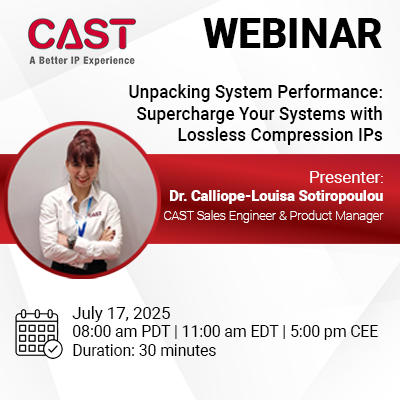In today’s data-driven systems—from cloud storage and AI accelerators to automotive logging and edge computing—every byte counts. The exponential growth in data volumes, real-time processing demands, and constrained bandwidth has made efficient, lossless data compression a mission-critical requirement. Software-based compression techniques, while flexible, often fall short in meeting the throughput, latency, and power requirements of modern hardware systems.
REGISTER HERE FOR THE LIVE WEBINAR
This webinar dives deep into the world of lossless data compression, with a focus on the industry’s most widely used algorithms: GZIP, LZ4, Snappy, and Zstd. Each of these algorithms presents a unique trade-off between compression ratio, speed, and resource requirements, making the selection of the right algorithm—and the right hardware implementation—crucial for performance and scalability.
We’ll start with a technical comparison of the four algorithms, highlighting their core mechanisms and application domains. You’ll learn how GZIP’s DEFLATE approach, LZ4’s lightning-fast block compression, Snappy’s simple parsing model, and Zstd’s dictionary-based hybrid technique serve different use cases—from archival storage to real-time streaming.
From there, we’ll examine the limitations of software compression, particularly in embedded and high-performance designs. You’ll see how software implementations can quickly become bottlenecks, consuming excessive CPU cycles and failing to maintain line-rate performance. This sets the stage for hardware-accelerated compression, which delivers deterministic latency, high throughput, and significant energy savings—critical in FPGA and ASIC implementations.
The webinar will explore the capabilities and performance of HW implementations of the above compression algorithms, studying trade-offs between latency, compression ratio and resources and using examples taken from CAST’s extended portfolio:
ZipAccel-C/D: A GZIP-compatible DEFLATE engine with industry-leading ratio and throughput.
LZ4SNP-C/D: Optimized for ultra-low latency and high-speed performance in real-time systems, using the LZ4 and Snappy algorithms.
You’ll gain insights into integration strategies, including AXI and streaming interface compatibility, resource usage for FPGA vs. ASIC targets, and customization options available through CAST’s flexible IP design process.
Through real-world application examples—ranging from high-speed data transmission to on-board vehicle data logging—we’ll demonstrate how these cores are enabling next-generation performance across industries.
Whether you’re an FPGA designer, system architect, or IP integrator, this session will equip you with practical knowledge to select and implement the right compression core for your needs.
Join us to unpack the power of compression, boost your bandwidth efficiency, and gain the competitive edge that only silicon-optimized IP can deliver.
Webinar Abstract:
As data volumes surge across cloud, AI, automotive, and edge systems, efficient lossless compression has become essential for meeting performance, latency, and bandwidth constraints. This webinar explores the trade-offs and strengths of the industry’s leading compression algorithms—GZIP, LZ4, Snappy, and Zstd—highlighting how hardware-accelerated implementations can overcome the limitations of software-based solutions in demanding, real-time environments.
You’ll gain insights into latency vs. compression ratio vs. resource trade-offs, integration strategies for FPGAs and ASICs, and real-world applications like high-speed networking and automotive data logging. Discover how to boost your system’s efficiency and unlock next-level performance through compression IPs tailored for modern hardware.
Speaker:
Dr. Calliope-Louisa Sotiropoulou is an Electronics Engineer and holds the position of Sales Engineer & Product Manager at CAST. Dr. Sotiropoulou specializes in Image, Video and Data compression, and IP stacks. Before joining CAST she worked as a Research and Development Manager and an FPGA Systems Developer for the Aerospace and Defense sector. She has a long academic record as a Researcher, working for various projects, including the Trigger and Data Acquisition system of the ATLAS experiment at CERN. She received a PhD from the Aristotle University of Thessaloniki in 2014.
REGISTER HERE FOR THE LIVE WEBINAR
About CAST
Computer Aided Software Technologies, Inc. (CAST) is a silicon IP provider founded in 1993. The company’s ASIC and FPGA IP product line includes security primitives and comprehensive SoC security modules; microcontrollers and processors; compression engines for data, images, and video; interfaces for automotive, aerospace, and other applications; and various common peripheral devices. Learn more by visiting www.cast-inc.com.
Also Read:
CAST Advances Lossless Data Compression Speed with a New IP Core
CAST, a Small Company with a Large Impact on Many Growth Markets #61DAC
Share this post via:







Comments
There are no comments yet.
You must register or log in to view/post comments.